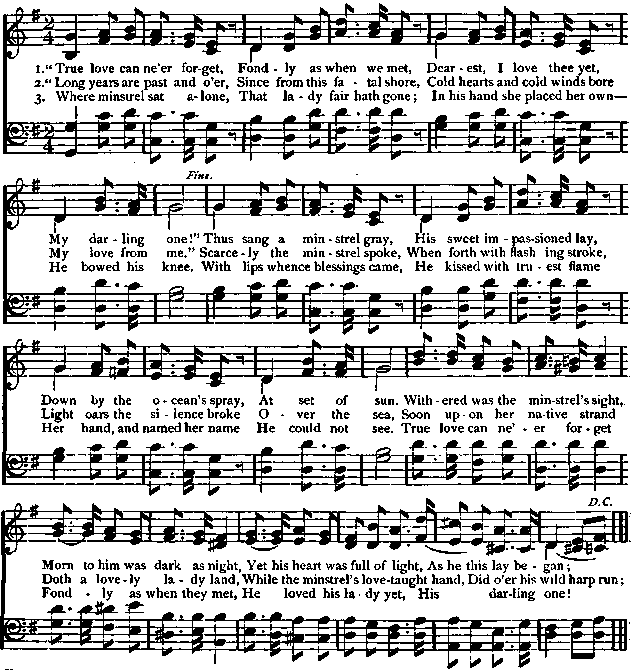Franklin Square Song Collection - online songbook
200 favorite songs and Hymns for Schools, Homes Lyrics & Sheet Music
| Share page | Visit Us On FB |
|
46 FRANKLIN-SQUARE
The incident which gave rise to the song, " True Love Can Ne'er Forget," by Samuel Lover, has been the foundation of several other ballads, some of them translated from the ancient Irish. The story i runs that Carolan, a blind harper, recognized his early love, Bridget Cruise, by the touch of her hand, although he had not met her for twenty years. The old lover was playing by the water, when a ferry-boat drew near, and he chanced to assist the lady to alight. |
SONG COLLECTION.
Turlogh O'Carolan, the bard, was one of the characters of Ireland. He was born in Nobber, county West-meath, in 1670, and was the last of the ancient race of Irish bards. He lost his eyesight at the age of sixteen. He made very beautiful words, but was chiefly noted for his exquisite melodies. Goldsmith, who had seen him in his boyhood, wrote in later life: "His songs may be compared to those of Pindar, they bearing the same flight of imagination."—Familiar Songs, |
|||
|
TRUE LOVE CAN NE'ER FORGET. |
Samuel Lover. |
|||
|
|
||||
 |
||||
|
|
||||
|
Invisible.—All the sounds we hear—the warning noises which keep us from harm, the beautiful musical notes with all the tunes and harmonies that delight us, even the power of hearing the voices of those we love, and learning from one another that which •iach can tell—all these depend upon the invisible vaves of air, even as the pleasures of light depend m the waves of ether. It is by these sound-waves hat nature speaks to us, and in all her movements here is a reason why her voice is sharp or tender, !oud or gentle, awful or loving. Why does the little brook sing so sweetly, while the wide, deep river jiakes no noise? Because the little brook eddies and |
purls round the stones, hitting them as it passes; sometimes the water falls down a large stone, and strikes against the water below, or sometimes it grates the little pebbles together as they lie in its bed. Each of these blows makes a small globe of sound-waves, which spread and spread till they fall on your ear, and because they fall quickly and regularly, they make a low musical note. We might indeed fancy' the brook recalling Shelley's beautiful lines:
Sometimes it fell Among the moss with hollow harmony, Dark and profound; now on the polished stones It danced ; like childhood laughing as it went- |
|||